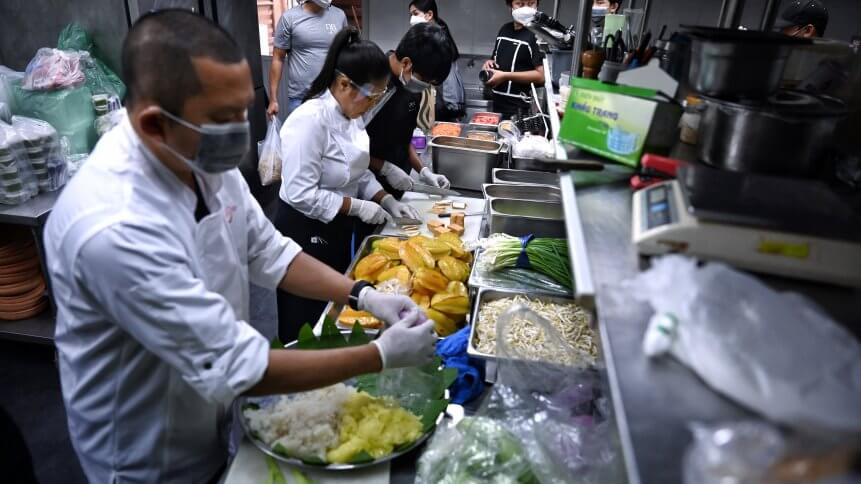Should businesses focus on food cyber security?

As COVID-19 slowly comes under control in parts of the world, food security remains a major concern globally. Ensuring there is sufficient food supply, especially in areas with harsh geographical conditions, is an ever-present challenge that is becoming a priority for certain areas.
While consumers are eager to know the contents of the food they are eating — be it prepared meals or raw produce — farmers, poultry owners, and food manufacturers all want insights not only on how they can produce better quality food, but also how they can create a sustainable sustenance supply chain.
For farmers, the weather and natural disasters play a huge impact on their crops. Droughts and flooding over the years have seen the agriculture industry suffer tremendously over decades. Lower harvests means lesser food, which in turn disrupts the entire food supply ecosystem and not just the affected area.
According to the UN, nearly 690 million people are hungry, or nearly 8.9 of the world population. This is why stabilizing food security is now a global priority. The UN’s hopes to end hunger, achieve food security, and improve nutrition as well as promote sustainable agriculture as part of their Sustainable Development Goals.

Diners eat at a restaurant in Shibuya district of Tokyo on August 1, 2021. (Photo by Philip FONG / AFP)
Technology and food
Blockchain, Artificial Intelligence (AI), IoT are three main technologies that can help improve food security for the future. Food manufacturers for example are using blockchain tech such as IBM Food Trust that enables the tracing of food from supplier to consumers. This allows them to have increased visibility on the production line and ensure supply is sufficient.
AI is being used to provide farmers better data analytics and predictive insights to aid them in making better-informed decisions. For example, India-based tech company Aggromalin enables farmers to diversify their production capabilities into animal husbandry and aquaculture too via its platform. It helps farmers to increase incomes from farming by organizing the input of supply as well as marketing outputs. The AI application of deep learning will eventually power IoT monitoring of their crops for these farmers as well.
Farmers are already using IoT sensors for various use cases today. Arable for example is a US-based IoT farming company that tracks some 40 weather and plant measurements using IoT sensors that give deeper visibility into climate variances, crop health, and help with the decisions they factor into, such as event timing and irrigation.
Combining all three technologies would give the industry the much-needed insights it needs to ensure food security does not become an issue. However, with more technologies being implemented, there are also greater chances of cyber risks.
Securing the food industry
While food security generally refers to the availability (or lack thereof) of food, securing the food supply chain also has to be top-of-mind for most farmers and food organizations. With the food supply sector promising good returns especially for food manufacturers, cybercriminals are always lurking, eager to exploit loopholes in the technology and to disrupt services.
According to information from the Cybersecurity and Infrastructure Security Agency, in the US alone there are an estimated 2.1 million farms, 935,000 restaurants, and well over 200,000 registered food manufacturing, processing, and storage facilities amounting to one-fifth of the nation’s economic activity.
One of the biggest cyberattacks on the food supply chain was the recent ransomware attack on global meat supplier, JBS. With 150 plants in 15 countries, the world’s largest meat supplier had its servers compromised by the infamous REVil ransomware, which saw its services disrupted in the US, Canada, and Australia. To resume operations, JBS had limited choices and chose to pay the ransom.
In 2017, Mondelez — another food manufacturer company that oversees brands like Cadbury and Oreo — was also the victim of a ransomware cyberattack after cybercriminals prohibited access to their IT systems.
With cybercriminals lurking, the food and agriculture industry, ranging from food manufacturers to farmers to food logistics need to ensure they have sufficient cyber security protection. As most in the food supply value chain often focus more on bringing in new technologies to better improve their productivity and services, cyber security often ends up as an afterthought, which it definitely should not be in this newer reality. Blockchain applications can be great enablers here to ensure secure, trustless, and permissionless records tracing and billing
YOU MIGHT LIKE

Here’s why ransomware attacks aren’t going anywhere
For small-scale farming and food manufacturers, cybersecurity will invariably be lower due to limited budgets. However, they can still deploy some protection or even work with manage service providers to better protect their business. At the end of the day, technologies like blockchain, AI and IoT can revolutionize food security, but turning a blind eye to cyber security could end up seeing the whole process kick off a global chain reaction that could have disastrous repercussions.








